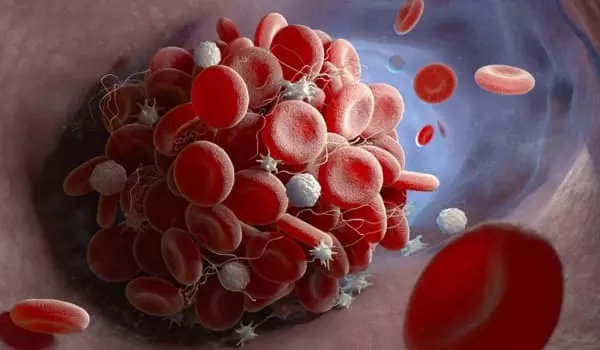Milvexian is an anticoagulant that inhibits factor XIa. It is taken orally. As of late 2021, it was being researched for the prevention of blood clots in surgical patients. Factor XIa inhibitors may be more effective and cause less bleeding than conventional anticoagulants in the prevention and treatment of venous and arterial thromboembolism. More research is needed to determine the efficacy and safety of milvexian, an oral factor XIa inhibitor.
Milvexian was compared to enoxaparin for blood clot prevention in 1,242 patients from 18 countries undergoing knee replacement surgery between June 2019 and February 2021. They discovered that at a total daily dose of 100 mg or higher, milvexian resulted in better clot protection but no increase in bleeding when compared to the control drug, enoxaparin. Milvexian was studied in daily doses ranging from 25 to 400 mg; there was no increase in bleeding across this broad dose range.
After a worldwide study led by McMaster University demonstrated that milvexian can be used with minimal side effects, an effective and safe oral pill is welcome news for people at risk of blood clots.
The most common side effect of current oral anti-clotting drugs is bleeding, and the fear of bleeding causes them to be underutilized. This necessitates the use of safer oral anticoagulants, which is where milvexian comes in.
Jeffrey Weitz
Milvexian is unique in that it works by inhibiting factor XIa, a clotting enzyme that causes dangerous thrombosis, or blood clots, but is not necessary for stopping bleeding from injuries. Milvexian was compared to enoxaparin for blood clot prevention in 1,242 patients from 18 countries undergoing knee replacement surgery between June 2019 and February 2021.
They discovered that at a total daily dose of 100 mg or higher, milvexian resulted in better clot protection but no increase in bleeding when compared to the control drug, enoxaparin. Milvexian was studied in daily doses ranging from 25 to 400 mg; there was no increase in bleeding across this broad dose range.

“The most common side effect of current oral anti-clotting drugs is bleeding, and the fear of bleeding causes them to be underutilized. This necessitates the use of safer oral anticoagulants, which is where milvexian comes in” Jeffrey Weitz, senior author, stated He is a McMaster University professor of medicine, biochemistry, and biomedical sciences. He is also the executive director of the McMaster and Hamilton Health Sciences Thrombosis and Atherosclerosis Research Institute.
“Blood clots are responsible for one out of every four deaths worldwide. Anticoagulants (blood thinners) are a mainstay in the treatment and prevention of clots in veins and arteries, and we urgently need safer oral medications to alleviate the burden of what are frequently lifelong conditions.”
The study was published in the New England Journal of Medicine, and Weitz presented a summary of the findings at the American Heart Association Scientific Sessions in 2021.
According to Weitz, blood clots are the root cause of heart attacks, strokes, deep vein thrombosis, and pulmonary embolism. Many of these conditions necessitate the use of anticoagulants for the rest of one’s life. As a result, safer oral anticoagulants such as milvexian are required.
He explained that the study focused on patients undergoing knee replacement surgery because they are at high risk for postoperative blood clots, which can be easily identified with venograms, which are x-rays of the veins in the legs. As a result, because effective and safe doses can be identified, this patient population is an ideal testing ground for new anticoagulants.
Weitz stated that his milvexian study is the first of several studies into oral factor XIa inhibitors. The findings of the other studies will most likely be published next year. The pharmaceutical companies Bristol Myers Squibb and Janssen Research and Development provided funding for the study.















